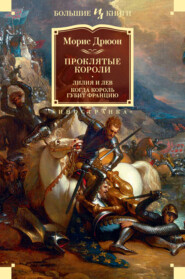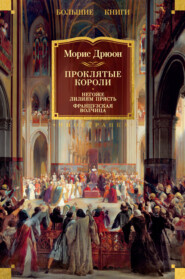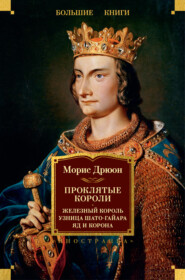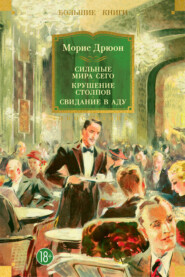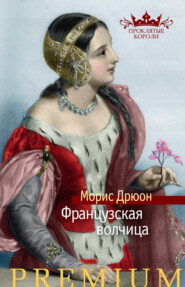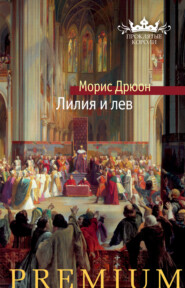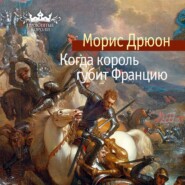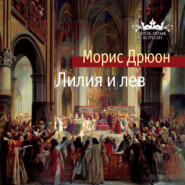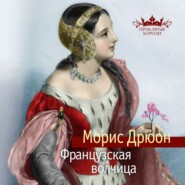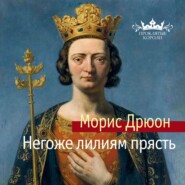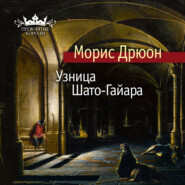По всем вопросам обращайтесь на: info@litportal.ru
(©) 2003-2024.
✖
The King Without a Kingdom
Автор
Год написания книги
2019
Настройки чтения
Размер шрифта
Высота строк
Поля
The conseillers du roi, who were the king’s advisors, all acted as if they adored their lord and master, although they were very much divided by the feud, some thinking it best to tie their fate to the constable’s star, others to gamble on the ability of the son-in-law to strike back. And the muffled struggles that divided them were all the more intense in that the king, despite wanting to appear to be the only one to make decisions, had always left the most important decisions to his entourage.
You see, my dear nephew, scheming takes place around all kings. But conspiracies and plots only happen around the weak kings, or around those whom a vice or the effects of illness have weakened. I would have liked to see them conspiring around Philip the Fair! Nobody dreamed of doing such a thing, nobody would have dared. This does not mean that strong kings are safe from conspiracies; but in that case, there have to be real traitors. Whereas around weak princes, it becomes natural even for honest people to become conspirators themselves.
The day before Christmas, 1354, in a Parisian town house, such strong words and insults were being bandied about between Charles of Spain and Philip of Navarre, brother of the king’s son-in-law, that the latter drew his dagger and came this close, if he hadn’t been surrounded, to stabbing the constable! The constable feigned laughter, and shouted at the young Navarre that he would have shown himself rather less threatening if there hadn’t been so many others around to hold him back. Philip is nowhere near as astute as his elder brother, but he is more impassioned in combat. No sooner had he been pulled from the room than he proffered the threat that he would exact prompt vengeance on this enemy of his family, and would make him take back his insult. And this threat he would carry out just two weeks later during the night of the feast of the Magi.
Monsieur of Spain was to visit his cousin, the Countess of Alençon. He stopped for the night at Laigle, at an inn whose name is difficult to forget, the Spinning Sow.14 (#litres_trial_promo) Overly confident of the respect that was inspired, or so he thought, by his title and the king’s friendship, he thought he had nothing to fear when travelling around the kingdom, and had taken with him but a small escort. Now the market town of Laigle is located in the County of Évreux, just a few leagues away from where the Évreux-Navarre brothers were staying in their vast castle. Forewarned of the constable’s impending visit, the brothers readied themselves and prepared an ambush.
Around midnight, twenty Norman soldiers, all tough noblemen, the Sire of Graville, the Sire of Clères, the Sire of Mainemares, the Sire of Morbecque, the Knight of Aunay … yes! the descendant of one of the suitors of the Tower of Nesle; it wasn’t at all surprising that he would be found on the side of Navarre … In short, I’m telling you, a good twenty armed knights, whose names are well known since the king had later to sign, against his better judgement, their letters of remission … sprang up in the town from nowhere, led by Philip of Navarre, broke down the doors of the Spinning Sow and stormed the stairs up to the constable’s accommodations.
The King of Navarre was not with them. In case things went awry he had chosen to wait on the outskirts of the town, beside a barn, in the company of his horse guards. Oh! I can see him now, my Charles the Bad, wound up in his coat, bounding backwards and forwards like a wisp of hell’s smoke the length and breadth of the frozen ground, like the devil who never touches the earth. He waits. He looks at the winter sky. The cold nips his fingers. His soul is twisted with both fear and hatred. He listens intently. He resumes his worried pacing up and down.
First to appear from the direction of the town is John of Fricamps, known as Friquet, the Governor of Caen, his advisor and most zealous machine15 (#litres_trial_promo) builder, who tells him, gasping for breath: ‘The deed is done, monseigneur!’
Then Graville, Mainemares, Morbecque arrive, and Philip of Navarre himself, and all the conspirators with him. At the inn, they pulled the handsome Charles of Spain out from under his bed where he had taken refuge, and now he was indeed dead, still dressed in his nightgown. They had wickedly run him through, stabbed him eighty times over; eighty body wounds would later be found on him. Each of Navarre’s men had wanted to stick his sword in four times … That is how, messire my nephew, King John was to lose his good friend, and how Monseigneur of Navarre would fall into rebellion …
Now would you please give up your seat for Dom Francesco Calvo, my papal secretary, with whom I wish to converse before we reach our next stop.
7 (#ulink_960a510f-3b2a-58ec-a909-094d5fcee290)
News from Paris (#ulink_960a510f-3b2a-58ec-a909-094d5fcee290)
DOM CALVO, AS I will be most busy upon my arrival in La Péruse, inspecting the Abbey to see if it has indeed been so badly laid to waste by the English as to justify the exemption the monks have asked of me, from paying me my prior’s benefices for a full year, I want to tell you forthwith what should appear in my letter to the Holy Father. I should be obliged if you would prepare the letter as soon as we arrive, with the fine turn of phrase that you are accustomed to using.
We must let the Holy Father know of the news from Paris that reached me in Limoges, and that has been worrying me since.
First of all, the scheming of the prevost of the merchants of Paris, Master Étienne Marcel. I learned that for the last month the prevost has been building fortifications and digging ditches around the town, beyond the old walls, as if he were preparing against a siege. And yet at the present juncture in the never-ending peace talks, the English have shown no intention nor sign whatsoever of threatening Paris, and such haste in building defences is beyond comprehension. But besides that, the prevost has been organizing his bourgeois into corps of municipal officers, whom he has armed and trained, with district commanders and their officers and their NCOs16 (#litres_trial_promo) to ensure that orders are followed, exactly in the image of the Flemish militia who take it upon themselves to govern their own cities. He imposed upon monseigneur the dauphin, the king’s lieutenant, to agree to the constitution of this militia, and, what’s more, while all royal taxes and tallage are generally the object of complaint and refusal, the prevost, in order to equip his men, managed to put into effect a levy on drink that is paid directly to him.
Ever since the misfortune of Poitiers, this Master Marcel, who formerly made himself rich provisioning the king, but who was piqued four years ago when he lost this role as royalty’s most prestigious supplier, has been meddling in all of the kingdom’s affairs. It is difficult to gauge his designs, beyond making himself important; but he is hardly heading down the path of appeasement that our Holy Father wishes for. Also my pious duty is to advise the pope that, should any request from that party reach him, he should show himself most haughty and give no support whatsoever, not even the semblance of support, to the Prevost of Paris and his undertakings.
You have already understood me, Dom Calvo. The Cardinal Capocci is in Paris. He could well, impulsive as he is and never failing to blunder, think himself clever in hatching plots with this prevost … No, nothing specific has been reported to me; but my instinct tells me there is one of those twisted schemes afoot in which my fellow legate never fails to get involved.
Secondly, I would like to invite the supreme pontiff to be informed in detail about the strange events that went on at the Estates-General of the Langue d’Oil17 (#litres_trial_promo) which ended in Paris at the beginning of the month, and to shed on them some light of his holy attention.
Convocation of these Assemblies had been promised by King John to take place in December; but due to the turmoil, disorder and despondency the kingdom found itself in following the defeat at Poitiers, the Dauphin Charles thought himself to be acting wisely when he brought forward the meeting to October. In truth, he had no choice but to try to strengthen his authority, which had come to him in this misfortune, young as he was, with an army in tatters from military setbacks, and a Treasury in dire straits.
But the eight hundred deputies of the Langue d’Oil, of which four hundred were bourgeois, didn’t deliberate on the issues they were invited to discuss.
The Church has long experience of councils that elude the intentions of those who first set them up. I would like to tell the pope that this assembly looks exactly like a council that has lost its way and assumed the right to rule over everything, hurling itself recklessly into reform, taking advantage of the weakness of the supreme power.
Instead of busying themselves with the release of the King of France, our people in Paris immediately showed more concern for the release of the King of Navarre, which clearly indicates which side their leaders are on.
In addition, the eight hundred appointed an eighty-strong commission: this began to toil away in secret to produce a long list of remonstrances containing a little that is right, and a great deal that is wrong. Firstly, they demanded the dismissal and judicial trial of the principal advisors of the king, whom they accuse of misappropriating funds, and whom they hold responsible for the defeat …
On that point, I must say, Calvo … this is not to go in the letter, but just to share my thoughts with you … the remonstrances are not totally unjustified. Amongst those appointed by King John to his government, I know there are some who are worthless, and even downright scoundrels. It is natural that a man should increase his own fortune when in high office, otherwise nobody would take on the burden or the risk. But one should be careful not to overstep the limits of dishonesty and look after one’s own affairs at the expense of public interest. And above all, one must be capable. And King John, not being that capable himself, wilfully chooses people who are not capable at all …
But from that time on, armed with the remonstrances, the deputies increasingly made excessive demands. They demanded that the king, or for the time being the dauphin, govern only with advisors approved by the three estates: four prelates, twelve knights, twelve bourgeois. This council was to have the power to organize and carry through everything that the king had always done previously on his own authority; it would appoint all offices, would be entitled to reform the Court of Accounts18 (#litres_trial_promo) and any other of the kingdom’s legally appointed bodies, could decide on a prisoner’s ransom, and on many other things as well. In truth, its aim was nothing less than stripping the king of all the attributes of sovereignty.
In this way the kingdom would no longer be governed by the one anointed and consecrated according to our Holy Religion; its helm would be entrusted to this council, deriving its entitlement only from a chattering assembly, and the whole governance of the kingdom would be entirely dependent upon it. What weakness and what confusion! Its supposed reformations … you must understand me, Dom Calvo; and I want to insist on this, as the Holy Father mustn’t be able to say that he hadn’t been warned … these supposed reforms are an insult to common sense and are redolent even of heresy.
And that men of the cloth should side with the Assembly is most regrettable, take the Bishop of Laon for example, Robert Le Coq, who like Marcel had also lost favour with the king, and is thus in close accord with the prevost. He is one of the most vehement.
The Holy Father must see that behind all this agitation is to be found the King of Navarre who seems to be leading the dance from his prison cell, and who will be making matters yet worse should he continue. The Holy Father, in his infinite wisdom, will judge it necessary to avoid intervening in any way whatever to get Charles the Bad, I mean, Monseigneur of Navarre, released from jail, as so many petitions coming from all sides must be begging him to do.
As far as I am concerned, using my prerogatives of papal legate and nuncio … are you listening to me, Calvo? I have commanded that the Bishop of Limoges be part of my retinue to be presented in Metz. He will join me in Bourges. And I have resolved to do as much with all the other bishops en route, including the dioceses pillaged and devastated by the raids of the Prince of Wales, so that they may bear witness before the emperor. I will thus strengthen my case and demonstrate how pernicious the alliance between the Kings of Navarre and England may prove to be …
But why on earth must you keep looking out of the window, Dom Calvo? Ah! It is the swaying motion of my palanquin that turns your stomach! I myself am used to it, and would even dare to say that it stimulates my mind; and I see that my nephew, Messire of Périgord, who has often kept me company since we set out, is not at all adversely affected by it. You do indeed look a little queasy. Very well, you shall get to step down. But don’t forget any of what I have told you when you take up your quill.
8 (#ulink_94814d06-aea9-5a33-a292-3866446a07e5)
The Treaty of Mantes (#ulink_94814d06-aea9-5a33-a292-3866446a07e5)
WHERE ARE WE NOW? Have we passed Mortemart? Not yet! It would seem that I have slept a little … Oh! How the sky darkens and how the days are shortening! I was dreaming, you see, my nephew, I was dreaming of a blossoming plum tree, a big plum tree, round and white, laden with birds, as if each flower were singing. And the sky was blue, the same blue as the Virgin’s mantle. An angelic vision, a true corner of paradise. What strange things are dreams! Have you noticed that in the gospel, no dreams are recounted, except for Joseph’s at the beginning of Saint Matthew? It is the only one. Whereas in the Old Testament, the patriarchs are forever having dreams, in the New, no one dreams at all. I have often wondered why, without being able to find an answer … Has that never struck you as rather odd? It is because you are no great reader of the Holy Scriptures, Archambaud … I see a fine subject for our brilliant scholars in Paris or Oxford to fight over amongst themselves and to provide us with voluminous treatises and discourses in a Latin so impenetrable nobody could understand a word …
In any case, the Holy Spirit advised me well in taking me out of my way via La Péruse. You saw those good Benedictine monks who wanted to take advantage of the English raid to avoid paying their prior’s commendams? I will get the enamel crucifix replaced and the three golden chalices that they hurriedly gave the English in order to avoid being pillaged; and they will settle up their annual payments.
They were naively looking to get themselves confused with the inhabitants of the other bank of the River Vienne, where the Prince of Wales’s rovers wreaked havoc, pillaging and burning, as we saw only too well this morning in Chirac and in Saint-Maurice-des-Lions. And especially in the Abbey of Lesterps where the Canons Regular19 (#litres_trial_promo) showed great valour. ‘Our abbey is fortified; we will defend it.’ And they fought, those canons, as good and brave men that refuse to be taken. Several perished in the attack, who acted more nobly, to my knowledge, than many a knight at Poitiers.
If only all the people of France had as much heart … even so they found the means, those honest canons in their charred monastery, to offer us a copious and well-prepared dinner, which helped me sleep soundly that night. And have you noticed the look of holy cheer they wear upon their faces? ‘Our brothers were killed? They are now in peace; God has welcomed them in His leniency … If He left us here on earth it is so that we can accomplish good works … Our monastery is half destroyed? We have the chance to rebuild it and make it even more beautiful than before …’
Good men of the cloth are joyous, my nephew, remember that. I am wary of overly severe fasters with their long faces and their burning, close-set eyes, as if they had spent too long squinting at hell. Those God honours most highly by calling them to His service have an obligation to show in their manner the joy this brings them; it is an example and a courtesy that they owe to other mortals.
In the same way as kings, since God has elevated them over and above all other men, they have the duty to show self-control. Messire Philip the Fair who was a paragon of true majesty, condemned without showing anger; and he mourned without shedding a tear.
On the occasion of Monsieur of Spain’s murder, that I was telling you about yesterday, King John showed all too well, and in the most pitiful fashion, that he was incapable of the slightest restraint in his passions. Pity is not what a king should inspire; it is better that one believes him impervious to pain. Four long days our king refrained from speaking a word, not even to say if he wanted to eat or drink. He kept to his rooms, acknowledging nobody, abandoning control of himself, eyes reddened and brimming, stopping suddenly to burst into tears. It was pointless talking to him about any business. Had the enemy invaded his palace, he would have let himself be taken by the hand. He hadn’t shown a quarter of such grief when the mother of his children, Madame of Luxembourg, passed away, something that the Dauphin Charles didn’t fail to mention. It was in fact the very first time that he was seen to show contempt for his father, going so far as to tell him that it was indecent to let himself go like this. But the king would hear nothing.
He would emerge from his state of despondency only to start screaming … that his charger be saddled immediately; screaming that his army should be mustered; screaming that he would speed to Évreux to take his revenge, and that everyone would be trembling with fear … Those close to him had great difficulty in bringing him to his senses and explaining to him that to get together his army, even without his arrièreban,20 (#litres_trial_promo) would take at least one month; that if he really wanted to attack Évreux, he would inevitably force a rift with Normandy; he should recall, as a counter-argument for this, that the truce with the King of England was about to expire, and that monarch might be tempted to take advantage of the chaos, the kingdom could be jeopardized.
He was also shown that, perhaps if he had simply respected his daughter’s marriage contract and kept his promise to give Angoulême to Charles of Navarre, instead of offering it as a gift to his dear constable …
John II stretched out his arms wide and proclaimed: ‘Who am I then, if I can do nothing? I can clearly see that not one of you loves me, and that I have lost my support.’ But in the end, he stayed at home, swearing to God that never would he know joy until he had been avenged.
Meanwhile, Charles the Bad didn’t remain idle. He wrote to the pope, he wrote to the emperor, he wrote to all the Christian princes, explaining to them that he hadn’t wanted Charles of Spain’s death, but only to seize him for insults received, and the harm he had suffered at his hand; truly his men had overstepped his orders, but he was prepared to assume responsibility for it all and stand up for his relatives, friends and servants who had been driven, in the tumult of Laigle, by an overzealous concern for his well-being.
Having set up the ambush like a highway brigand, this is how he portrayed himself, wearing the gloves of a knight.
And most importantly he wrote to the Duke of Lancaster, who was to be found in Malines, and also to the King of England himself. We got wind of these letters when things began to turn sour. The Bad One certainly didn’t beat about the bush. ‘If you summon your captains in Brittany to ready themselves, as soon as I send for them, to enter in Normandy, I will grant them good and sure passage. You should know, dearest cousin, that all the nobles of Normandy are with me in death as in life.’ With the murder of Monsieur of Spain, our man had chosen rebellion; now he was moving towards treason. But at the same time, he cast upon King John the Ladies of Melun.
You don’t know whom we mean by that name? Ah! It’s raining. It was to be expected; this rain has been threatening us from the outset. Now you will bless my palanquin, Archambaud, rather than having water running down your neck, beneath your coathardy, and mud caking you to the waist …
The Ladies of Melun? They are the two queens dowager, and Joan of Valois, Charles’s child-bride, who is awaiting puberty. All three live in the Castle of Melun, that is called the Castle of the Three Queens, or even the Widows’ Court.
First of all there is Madame Joan of Évreux, King Charles IV’s widow and aunt to our Bad One. Yes, yes, she is still alive; she isn’t at all as old as one would think. She is barely a day over fifty; she is four or five years younger than me. She has been a widow for twenty-eight years already, twenty-eight years of wearing white. She shared the throne just three years. But she has remained an influence in the kingdom. She is the most senior, the very last queen of the great Capetian dynasty. Yes, of the three confinements she went through … three girls, of which only one, the one birthed after the king’s death, is still living … had she given birth to a boy, she would have been queen mother and regent. The dynasty came to an end in her womb. When she says: ‘Monseigneur of Évreux, my father … my uncle Philip the Fair … my brother-in-law Philip the Tall …’ a hush descends. She is the survivor of an undisputed monarchy, and of a time when France was infinitely more powerful and glorious than today. She is guarantor for the new breed. So, there are things that are not done because Madame of Évreux would disapprove of them.
In addition to this, it is said around her: ‘She is a saint.’ You have to admit that it doesn’t take much when one is queen, to be looked upon as a saint by a small and idle court where singing others’ praises passes as an occupation. Madame Joan of Évreux gets up before dawn; she lights her candle herself so as not to disturb her ladies-in-waiting. Then she begins to read her book of hours, the smallest in the world so we are led to believe, a gift from her husband who had commissioned it from a master limner,21 (#litres_trial_promo) Jean Pucelle. She spends much time in prayer and regularly gives alms. She has spent twenty-eight years repeating that, as she had been unable to give birth to a son, she had no future. Widows live on obsessions. She could have carried more weight in the kingdom if she had been blessed with intelligence in proportion to her virtue.
Then there is Madame Blanche, Charles of Navarre’s sister, second wife of Philip VI, a queen for just six months, barely time enough to get accustomed to wearing a crown. She has the reputation of being the most beautiful woman of the kingdom. I saw her, not long ago, and can willingly confirm this judgement. She is now twenty-four, and for the last six years has been wondering what the whiteness of her skin, her enamel eyes and her perfect body are all for. Had nature endowed her with a less splendid appearance, she would be queen now, since she was intended for King John! The father only took her for himself because he was transfixed by her beauty.
Not long after she had accompanied her husband’s body to the grave that was prepared, she was proposed to by the King of Castile, Don Pedro, whose subjects had named the Cruel. She responded, rather hastily perhaps, that: ‘A Queen of France does not remarry.’ She was much praised for this display of grandeur. But she wonders to this day if it is not too great a sacrifice she has made for the sake of her title and whatever rights she still has to her former magnificence. The domain of Melun is her dower. She has made many improvements to it, but she can well change the carpets and tapestries that make up her bedroom at Christmas and Easter; she will always sleep there alone.






